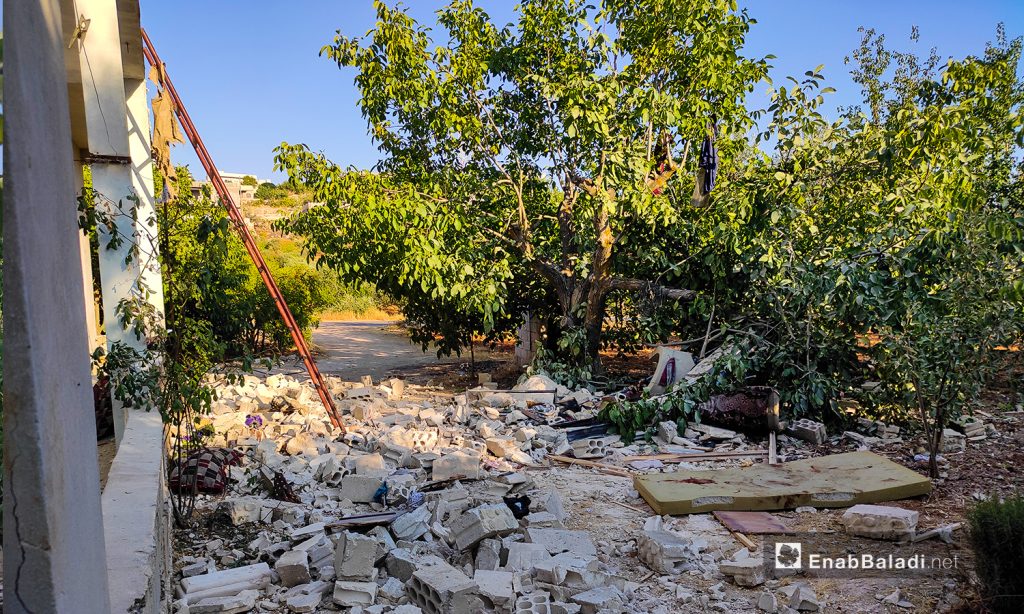“We are forced to be here in Jabal al-Zawiya to harvest our ripe figs despite the attacks by the Syrian regime,” Amer Shehadeh Khatib, a farmer and resident of Jabal al-Zawiya, south of Idlib, explained to Enab Baladi.
Jabal al-Zawiya residents depend mainly on good harvests, including figs, cumin, olives, and others, to make ends meet in light of the increasingly protracted displacement and the lack of job opportunities in the opposition-controlled areas in northwestern Syria.
Some families reportedly lost their lives while harvesting their crops, sometimes due to exploding mines and ordnance. Other times they were deliberately targeted by the Syrian regime.
Faisal al-Khalil, a farmer from the village of Kansafra, located in Jabal al-Zawiya, lost his four children (Ayat 12, Muhammad 9, Hatem 3)on 20 August in shelling by the Bashar al-Assad regime, in breach of a truce in northwestern Idlib de-escalation zone.
Enab Baladi’s correspondent quoted the military command in the region as saying that the villages and towns of Kafr Oweid, Kansafra, al-Fateera, Sufuhan and al-Bara are the most dangerous places for civilians’ safety because they are on the lines of contact with the regime. However, the villages and towns behind these contact lines are considered less dangerous.
Military commander of the Elite Army of the National Front for Liberation (NFL) Raed Salem told Enab Baladi that people insist on harvesting their crops, coinciding with the bombardment of various villages of Jabal al-Zawiya.
Al-Fateh al-Mubeen Operations Room, which includes Hayat Tahrir al-Sham (HTS) and the NFL, and is responsible for managing the area militarily, provides many facilities for civilians behind the frontlines. For example, with the help of its military observatories, the room informs farmers of coordinates that might be hit by the regime. It also helps those who get injured during their work.
The room also warned farmers of regime reconnaissance aircraft approaching their sites. It tells them about the appropriate time for harvesting, usually in the early morning or late in the afternoon when there are no aircraft flying over.
Raed Salem confirmed that the military warned people harvesting their crops in Jabal al-Zawiya not to approach the frontlines without going back to the operations rooms.
Salem stressed that people should not enter the battle lines or be in front of them.
Airstrikes and landmines
On 2 September, the young Muhammad Nader al-Bakour was killed in the town of al-Bara, following a landmine explosion.
Last August, the Syrian Civil Defence (SCD) teams responded to five mine incidents in Jabal al-Zawiya, southern countryside of Idlib.
On 23 August, a civilian was injured when remnants of explosives from the recent fighting went off.
On 28 August, a young man was wounded in a mine explosion as well.
On 11 August, a young man was killed, and a child was injured, and four other civilians were injured while they were picking figs in the vicinity of al-Bara.
And it is not only mines that claimed the lives of civilians during the fig season, as the regime forces targeted farmers during their work in picking figs, causing both deaths and injuries.
The regime has escalated its artillery shelling and missile attacks on opposition-controlled areas in northwestern Syria, coinciding with the warplanes’ raids on Idlib governorate since the beginning of last June.
Idlib governorate has been subjected to daily raids by the regime forces and Russia since 19 August.
The governorate is subject to the Moscow agreement signed on 5 March 2020, which stipulated a ceasefire as the most crucial condition. However, the Assad regime and its main ally Russia continue bombing opposition-controlled areas.
The SCD documented the response of rescue and ambulance teams, since the beginning of the latest escalation of the regime and Russia’s forces in northwestern Syria from June until 18 August as amounting to more than 425 attacks.
The attacks resulted in the death of 101 people, including 32 children and 18 women, and two SCD volunteers.
More than 270 people were injured due to these attacks, including more than 67 boys and girls under the age of 14.
Warning of uncoordinated harvesting
The HTS, via a statement, asked farmers in the Jabal al-Zawiya area not to approach agricultural lands to harvest figs without coordinating with its entrusted agents.
The HTS divided the area administratively into three sections; the first extends from the south of Kafr Oweid village to the villages of Sufuhan and al-Fateera; the second consists of the entire line adjacent to the town of Kansafra, and the third includes the whole line adjacent to the town of al-Bara and the village of Deir Sunbul to the east.
During 2020, the SCD’s UXO teams specialized in surveying and removing unexploded ordnances (UXO), conducted more than 600 operations to remove explosive remnants of war (ERW), and disposed of about 620 various munitions. Survey teams worked 167 mappings, in which 237 contaminated areas were identified.
The Syrian regime and Russia carried out 546 cluster bomb attacks on northern Syria, from 26 April 2019 until 5 March 2020, reported the SCD.
The SCD also confirmed that thousands of these bombs did not explode, becoming ticking time bombs threatening the lives of civilians, especially children.
Unexploded objects and munitions pose a direct threat to the camp residents, threatening their lives. The explosions often killed civilians and resulted in severe injuries and amputations, especially among children, according to Ibrahim Abu al-Laith, the director of the media office of the SCD in northern Syria.











